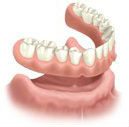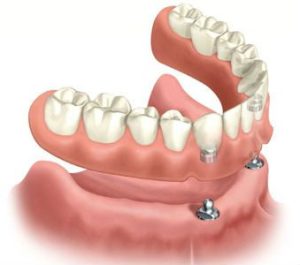If you are missing all or most of your teeth, you may have thought that removable dentures were the only way to go. But that’s not the case anymore. Implant-supported dentures can make living with dentures much easier. They not only solve some of the most common problems dentures wearers complain of, they prevent the bone loss that can lead to facial collapse.
What Are Implant Overdentures?
As the name implies, implant overdentures are dentures that fit over dental implants, which are root forms that mimic your tooth roots. These root forms are placed surgically in the jawbone. As they heal, the body brings more bone-building minerals to the site to encase the forms in new bone, making them very strong and stable. The denture can then be snapped onto the implants. Depending on how much support is needed and your budget, two, four, or more implants can be used to support the overdenture.
Hybrid Implant Dentures
Also known as a fixed implant denture, a hybrid implant denture needs to be supported by at least four implants. The denture is then screwed onto the implants. This provides a very secure system. It is so stable and comfortable, many patients say that it feels like they have their own teeth back.
Common Problems with Dentures
 People who are experiencing having dentures for the first time often find that they’re tough to get used to. To begin with, the lower denture arch rests on the ridge of jawbone covered by the gums and is held in place by gravity. The illustration to the left shows this. Because the lower denture moves around in the mouth, it can take some work to learn how to chew effectively. It is controlled by your tongue and cheeks. In addition, the gum tissue can become irritated and sore.
People who are experiencing having dentures for the first time often find that they’re tough to get used to. To begin with, the lower denture arch rests on the ridge of jawbone covered by the gums and is held in place by gravity. The illustration to the left shows this. Because the lower denture moves around in the mouth, it can take some work to learn how to chew effectively. It is controlled by your tongue and cheeks. In addition, the gum tissue can become irritated and sore.
The upper denture covers the palate and is held in place by suction, so it feels more secure and doesn’t move around as much. But the palate has some taste buds, so this reduces your enjoyment of your food. It can also affect your pronunciation of some words, and can be susceptible to falling out.
But the most important problem is that bone loss accompanies dentures because they replace only the exposed part of the tooth. When we lose a tooth along with its roots, the body no longer receives signals that the jawbone in that location is essential. The body naturally re-absorbs the minerals in that part of the jawbone for use elsewhere in the body. Given as few as ten or twenty years, this process can lead to facial collapse. Visually, this is the shrunken in appearance we associate with great age. But it is serious, because when there is no more jawbone ridge, it becomes difficult to support dentures. When this happens, chewing efficiency is so compromised that some people can only eat soft foods, which can lead to more serious health consequences.
Choices in Implant-Supported Dentures
 With as few as two implants, “snap-on” dentures can provide a stable foundation that will help alleviate the problems we’ve discussed above. The illustration to the left shows what snap-on dentures look like. People with bone loss can often benefit from bone grafting or the All-On-4 technique. And hybrid dentures can also be secured with four to eight normal implants.
With as few as two implants, “snap-on” dentures can provide a stable foundation that will help alleviate the problems we’ve discussed above. The illustration to the left shows what snap-on dentures look like. People with bone loss can often benefit from bone grafting or the All-On-4 technique. And hybrid dentures can also be secured with four to eight normal implants.
Dr. Dang will be happy to discuss your options with you, so you can make an informed decision about the type of implant-supported dentures that will work best for you and your budget.
Then when you want to find out how this treatment could help you, call our office at (480) 994-1266 or complete our Request an Appointment form. Dr. Dang also offers a complimentary consultation, so if you would like to meet him and discuss your situation with him before you commit to a full exam, please just let us know. We will be here to help you find a time that works with your schedule.
